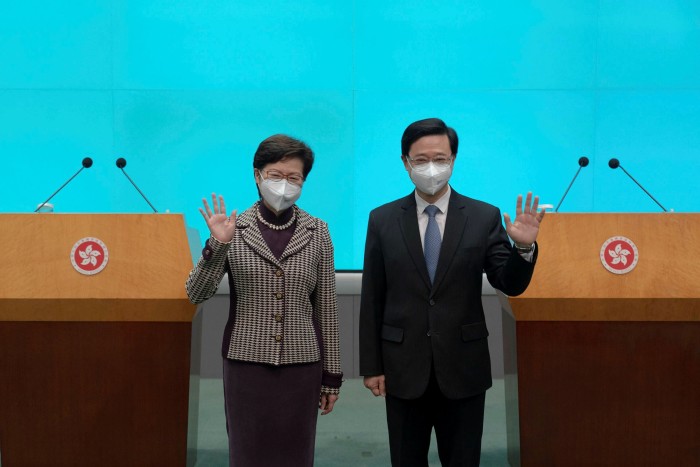Even before the arrest this week of its former top cleric, Hong Kong’s Catholic church had been worrying about the effect of the Chinese territory’s sweeping national security law.
Local Catholic leaders recently decided to cancel annual commemorations of China’s bloody crushing of protests in Tiananmen Square in 1989 for fear of violating the law imposed by Beijing two years ago, according to church insiders.
The cancellation of this year’s commemorative masses on June 4 underscores the chilling effect that Hong Kong’s intensifying political crackdown has already had even within religious communities.
But the arrest on Wednesday of Cardinal Joseph Zen has sent new shockwaves through the city just days after hardliner and former security chief John Lee, himself a Catholic, was confirmed as its next leader.
It is also likely to fuel divisions within the Catholic church about how to respond to increasing political repression in Hong Kong.
Police have accused Zen of colluding with foreign forces, an offence under the 2020 security law. The 90-year-old former bishop of Hong Kong is an outspoken human rights campaigner and was arrested along with four other trustees of a fund set up to help pay the legal and medical fees of participants in citywide pro-democracy demonstrations in 2019.
Priests and senior lay people in the Hong Kong church said that the targeting of the cardinal, who was released on bail on Wednesday night, had deeply saddened Catholics in the city.
“When he was arrested I was really shocked . . . I think there will be more suppression of the church in Hong Kong in the future,” said one, who like other church insiders declined to be identified for fear of repercussions from city authorities.
The Hong Kong church has for more than two decades commemorated the crushing by Chinese troops of student-led protests centred on Tiananmen Square on June 4 1989. But last year Hong Kong police officers were seen standing outside church doors holding video cameras.
“It’s not a safe time for us to hold the mass in public,” said one person involved in cancelling this year’s commemorations. “We have security concerns, because the political situation is getting tense.”
One priest said that this year “we will not mention June 4. But it will be in our hearts”.
Carrie Lam, Hong Kong’s outgoing chief executive, is a Catholic, and her successor Lee said last week that he still believed in the teachings he received as a child at a Jesuit school in Kowloon, Hong Kong.
But asked by the Financial Times about Zen’s arrest, which was condemned by human rights groups and governments including the US, Canada and UK, Lee made clear that Catholic credentials would be no protection for those accused of violating the security law. “Action will be taken accordingly regardless of the person’s background,” Lee said.
It was Lee who oversaw the introduction of the law in a previous role as security secretary. The Beijing-backed former policeman was officially confirmed as Hong Kong’s next leader on Sunday and will be sworn in on July 1.
“[Zen’s arrest] has also sent out a warning that even religious leaders . . . cannot be exempted from penalties under the law just because of their status,” said Lau Siu-kai, from the Chinese Association of Hong Kong and Macau Studies, a Beijing-based think-tank.
The Hong Kong church said it was “extremely concerned”. “We urge the Hong Kong police and the judicial authorities to handle Cardinal Zen’s case in accordance with justice,” the city diocese said. “We have always upheld the rule of law. We trust that in the future we will continue enjoying religious freedom in Hong Kong.”
Current bishop of Hong Kong Stephen Chow, who was appointed last year, has not taken any public stance on the security law.
However, the cardinal’s arrest is likely to widen divisions in the Hong Kong church between pro-democracy campaigners such as Zen and others who either supported the government or believed that the church should not be involved in politics.
Pro-democracy activists have accused the church of siding with the latter camp, with many citing a diplomatic deal in 2018 in which the Vatican agreed that Beijing should have a say in the appointment of bishops in China.
In the latest incident, a diocesan administrator tendered their resignation over a posting on the “Catholic Way” Facebook page on April 27. The post, which was quickly deleted, summarised a television interview in which a local priest accused China of attempting to control religion in Hong Kong. The diocese said the administrator had resigned of their own accord.
The police investigation of the 612 Humanitarian Relief Fund, of which Zen was a trustee and which supported pro-democracy protesters, could also have implications for Hong Kong’s legal system.
Police said on Thursday that they had complained to the Bar Association and Law Society about alleged misconduct by unnamed lawyers who took on the fund’s cases.
“Criminal investigation also revealed that a number of solicitors and barristers were suspected of professional misconduct when providing legal services,” police said.
“It’s obvious [the authorities] have commenced targeting lawyers who are providing support to political prisoners in Hong Kong,” said Eric Yan-ho Lai of the Georgetown Center for Asian Law. “Legal representatives should not be intimidated for who they represent.”
One Hong Kong priest said that no area of life in the city would escape the tightening of political controls.
“If you ask whether [local] priests are now more worried about the security law . . . I would tell you that everyone in Hong Kong is concerned about the law,” he said.


